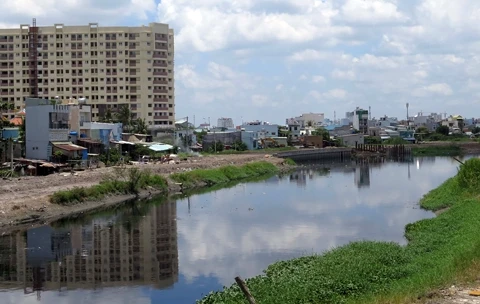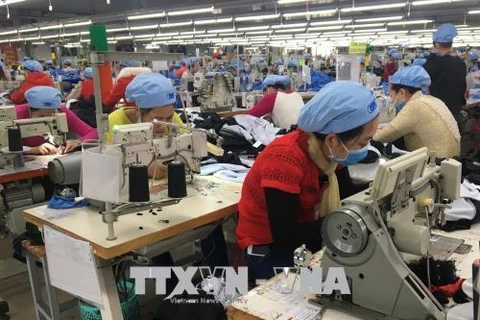Hanoi (VNS/VNA) - Authorities in the capital of Hanoi had planned to move 117 polluting facilities out of the inner city to make space for public schools, parking lots and public facilities.
However, two years since the project started, only seven of them have been relocated.
According to the municipal Department of Construction, the city is in urgent need of land to build schools and other facilities to serve social welfare.
By 2020, the city needs more than 17 million sq.m of land to build 728 schools, and by 2030, the city is targeting to build 1,060 new schools.
It is not clear when these targets will be reached if the relocation of polluting factories continues to face delays.
Businesses blamed the delayed relocation on slow land compensation payment, and say they would find it difficult to recruit skilled workers if the factories were located on the outskirts of the city or in another locality.
Big polluters
The longer the factories remain in the inner city, the more residents have to suffer.
A resident living near a factory belonging to Dong Xuan Knitting Sole Member Limited Liability Company in Vinh Tuy Ward, Hai Ba Trung District, told Vietnam News Agency that black and white and smoke rising from the factory at midnight, and some feel a shortness of breath.
“Residents have reported the pollution to authorities but the factory has not been relocated while the company has already opened a new factory in Khoai Chau District in the neighbouring province of Hung Yen,” the resident said.
Nguyen Trai Street in Thuong Dinh Ward, Thanh Xuan District is a hot spot for polluting factories. Big companies like Sao Vang Rubber Company and Thang Long Tobacco Company have their factories there.
Residents living around said the air they breathe every day is filled with the smell of cigarettes and soap.
Residents living near textile, mechanics and engineering factories in Hanoi are suffering from not only noise and dust but also exposure to the long-term consequences of pollution to their health.
They did not have to wait for long because one of the most serious factory incidents in the city occurred in late August.
A major fire that broke out at a light bulb warehouse belonging to Rang Dong JSC raised public concern over mercury exposure, a toxic metal used in fluorescent lights.
According to the city’s Department of Planning, the seven factories that had been relocated had left the city more than 250ha of land in 11 districts.
Some public facilities have already been constructed on the land.
In Hai Ba Trung District, Le Ngoc Han Secondary School has a new location where the Hanoi Alcohol Factory used to stand. Ngo Thi Nham Primary School was constructed on land left by Dong Xuan Knitting Company.
However, the number of new schools and public facilities like that in Hanoi remains low.
Too many skyscrapers
Land given by relocated factories was handed over to skyscrapers of office, apartment buildings, putting pressure on the urban land.
In the area around Le Van Luong Road, there are now up to 70 buildings where dozens of thousands of people are working and living in.
According to experts, the relocation of polluting factories was urgent. However, the switch of land use purposes on these so-called ‘golden land lots’ needed to be transparent so that schools and parks were built to serve communities.
Architect Tran Huy Anh from the Hanoi Association of Architects said the relocation must be looked at seriously.
“If we remove polluting factories and replace them with apartment buildings, putting pressure on the city’s infrastructure, it will be another disaster,” he told Vietnam News Agency.
Tran Ngoc Chinh, Chairman of Vietnam’s Urban Development and Planning Association, said the city's Department of Natural Resources and Environment and relevant agencies must enforce the relocation plan. In return, companies can discuss any difficulties with local authorities.
Another anonymous expert told the Vietnam News Agency that the legal framework needed to be tightened in order to force businesses that had already received compensation to move. For companies that already had new premises, the city’s authorities must instruct them to move, otherwise, action will be taken to force them to hand over the land./.
However, two years since the project started, only seven of them have been relocated.
According to the municipal Department of Construction, the city is in urgent need of land to build schools and other facilities to serve social welfare.
By 2020, the city needs more than 17 million sq.m of land to build 728 schools, and by 2030, the city is targeting to build 1,060 new schools.
It is not clear when these targets will be reached if the relocation of polluting factories continues to face delays.
Businesses blamed the delayed relocation on slow land compensation payment, and say they would find it difficult to recruit skilled workers if the factories were located on the outskirts of the city or in another locality.
Big polluters
The longer the factories remain in the inner city, the more residents have to suffer.
A resident living near a factory belonging to Dong Xuan Knitting Sole Member Limited Liability Company in Vinh Tuy Ward, Hai Ba Trung District, told Vietnam News Agency that black and white and smoke rising from the factory at midnight, and some feel a shortness of breath.
“Residents have reported the pollution to authorities but the factory has not been relocated while the company has already opened a new factory in Khoai Chau District in the neighbouring province of Hung Yen,” the resident said.
Nguyen Trai Street in Thuong Dinh Ward, Thanh Xuan District is a hot spot for polluting factories. Big companies like Sao Vang Rubber Company and Thang Long Tobacco Company have their factories there.
Residents living around said the air they breathe every day is filled with the smell of cigarettes and soap.
Residents living near textile, mechanics and engineering factories in Hanoi are suffering from not only noise and dust but also exposure to the long-term consequences of pollution to their health.
They did not have to wait for long because one of the most serious factory incidents in the city occurred in late August.
A major fire that broke out at a light bulb warehouse belonging to Rang Dong JSC raised public concern over mercury exposure, a toxic metal used in fluorescent lights.
According to the city’s Department of Planning, the seven factories that had been relocated had left the city more than 250ha of land in 11 districts.
Some public facilities have already been constructed on the land.
In Hai Ba Trung District, Le Ngoc Han Secondary School has a new location where the Hanoi Alcohol Factory used to stand. Ngo Thi Nham Primary School was constructed on land left by Dong Xuan Knitting Company.
However, the number of new schools and public facilities like that in Hanoi remains low.
Too many skyscrapers
Land given by relocated factories was handed over to skyscrapers of office, apartment buildings, putting pressure on the urban land.
In the area around Le Van Luong Road, there are now up to 70 buildings where dozens of thousands of people are working and living in.
According to experts, the relocation of polluting factories was urgent. However, the switch of land use purposes on these so-called ‘golden land lots’ needed to be transparent so that schools and parks were built to serve communities.
Architect Tran Huy Anh from the Hanoi Association of Architects said the relocation must be looked at seriously.
“If we remove polluting factories and replace them with apartment buildings, putting pressure on the city’s infrastructure, it will be another disaster,” he told Vietnam News Agency.
Tran Ngoc Chinh, Chairman of Vietnam’s Urban Development and Planning Association, said the city's Department of Natural Resources and Environment and relevant agencies must enforce the relocation plan. In return, companies can discuss any difficulties with local authorities.
Another anonymous expert told the Vietnam News Agency that the legal framework needed to be tightened in order to force businesses that had already received compensation to move. For companies that already had new premises, the city’s authorities must instruct them to move, otherwise, action will be taken to force them to hand over the land./.
VNA






















